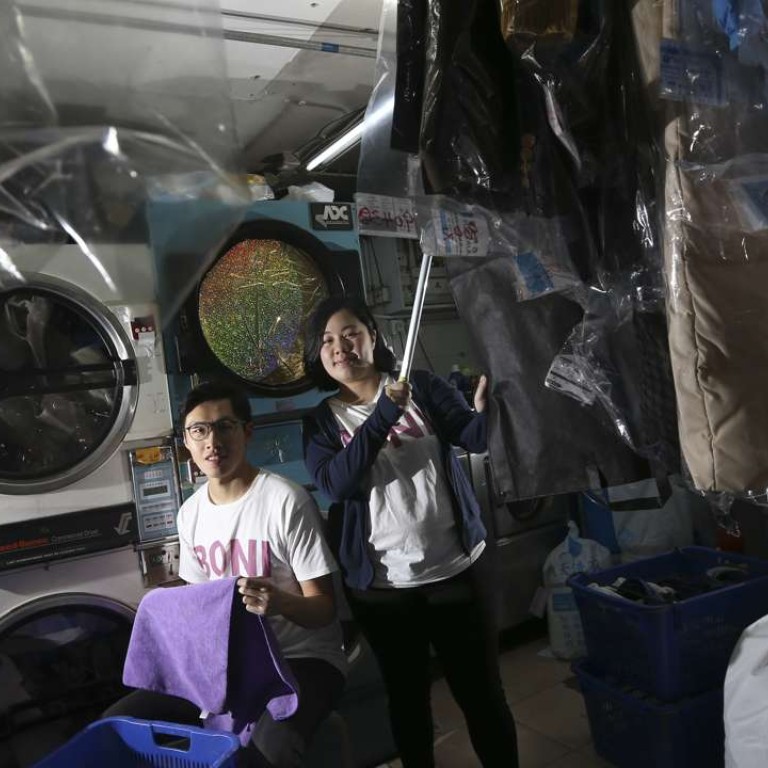
Convenience culture: start-ups serve as middlemen for time-poor Hongkongers
Rather than provide services themselves, start-ups operate apps that allow you to arrange pick-up, cleaning and delivery of your laundry, get quotes from tradesmen for home repairs, and order deliveries of restaurant meals
Doing your laundry can be a chore in Hong Kong, given the long hours many of us work. That’s why Kelvin Lee Ka-ho co-launched a start-up this year that, through a computer and mobile app, arranges for people’s washing to be picked up, laundered and returned.
The start-up, Boni.com.hk, has teamed up with a network of neighbourhood laundry services, which clean the clothes, and with delivery companies such as GoGoVan. It is among a new generation of start-ups that aim to make life more convenient for Hongkongers.
Another kind of start-up has staff to do your wet-market shopping for you

Deliveroo is another web- and app-based service that saves its customers time and hassle by home-delivering restaurant meals. It was founded in 2012 by Taiwanese-American William Shu and now operates in more than 10 countries. The Hong Kong branch, launched in November, covers Kowloon and Hong Kong Island, and plans to expand its reach to the New Territories.
These companies are middlemen; the services they offer – cleaning, repairs or meals – are provided by other parties.
In the case of Deliveroo, once a customer opens its app, it will locate their position using GPS and list nearby restaurants from which it can deliver meals. Deliveroo’s service model is built on delivering high-quality meals over short distances given its pledge to deliver within 32 minutes on average, whereas competitor Foodpanda offers cross-district delivery and targets lower-end restaurants.

Lo, 27, a Wharton School of Business graduate, says that to date Deliveroo has signed up around 300 Hong Kong restaurants, which pay the company commission on the deliveries. The company employs more than 100 motorcyclists to provide deliveries.
Deliveroo’s app allows customers to monitor the progress of their orders, from the time the food leaves the kitchen to the pickup to the street the driver is on. Deliveroo’s partners are high-end restaurants such as Mango Tree in Tsim Sha Tsui and Causeway Bay, and Korean restaurant chain School Food. Lo says the restaurants were initially reluctant to do takeaways for fear of the quality of their food being compromised. But Deliveroo’s ability to deliver food within the promised time has made an impression.
“Now, more and more restaurants are approaching us, saying they want to join,” says Lo.

Also able to call on a big network of vehicles is Boni, which uses some 60 part-time drivers from different delivery firms.
Co-founder Lee, 29, says that while its charges are similar to those of neighbourhood laundry services, its service offers customers greater convenience and flexibility. “We pick up even one piece of clothing for dry-cleaning. Customers can choose the time and place for collection and delivery [using the app],” he says.
We have dozens of orders every day now. The profit margin is low. But we are trying to establish market share
With around HK$1 million in start-up capital, the business graduate from the University of California, Los Angelesset up the company in Hong Kong’s Science Park.
“We have dozens of orders every day now. The profit margin is low. But we are trying to establish market share. When there are more customers, we will expand the base of laundry partners and the cost of logistics will decrease.”
Operating on a slightly different model is carwash.hk. It also uses an app to reach customers, but rather than have partners do the work, Leo To Chun-hong’s team is the service provider.
The start-up, founded in May by To, 33, a computer science graduate from the City University of Hong Kong, aims to provide a carwashing service at clients’ homes at a competitive price.
He says that while vehicle owners would pay between HK$120 and HK$170 at a car wash, his company charges HK$95. He is able to charge less because the washing is done by part-time staff, such as housewives and retirees, using a US-imported cleaning agent that doesn’t require water.
The real money, he says, comes from providing car detailing services such as waxing and coating, which cost between HK$1,000 and HK$2,000.
He says carwash.hk averages about 30 customers per day, and he expects to get more customers because many car parks in Hong Kong do not allow carwashing on location.

